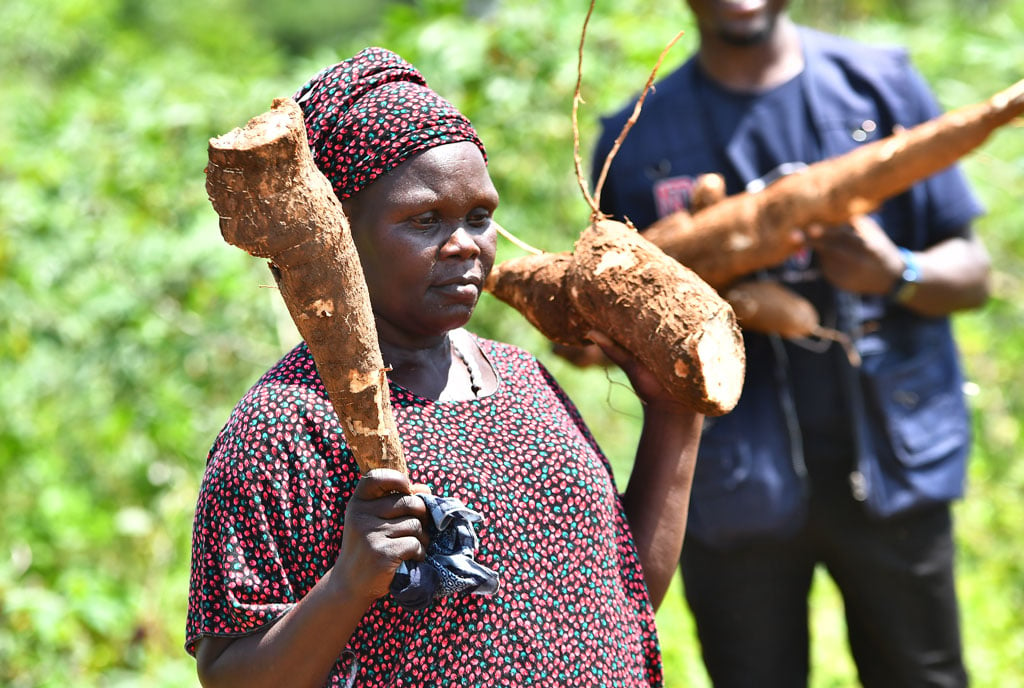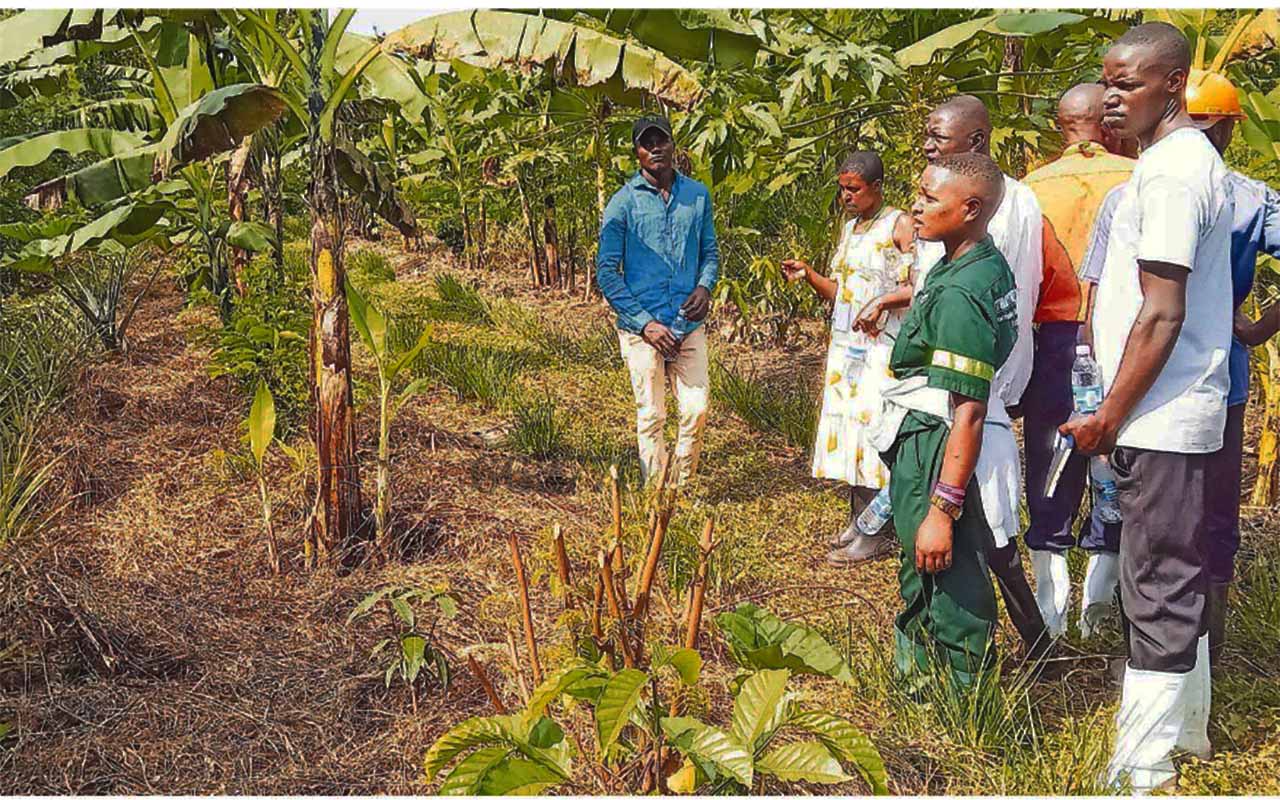
Winfred Adaku, an apiary farmer displays some of her products from honey. PHOTO/LOMINDA AFEDRARU
Most rural women in Uganda are engaged in agricultural activities, contributing 88 percent of agricultural labour force, an activity that contributes to 76 percent of Uganda's economy.
Women's traditional roles in agriculture are still influenced by their reproductive roles therefore, taking on responsibility for food production and security for their families.
Women in Uganda have also taken up cash crop farming within their small-scale farms although, majority do not control the earnings of the produce.
It is because of this that the Uganda National Farmers Federation (UNFFE) and the Young Farmers Federation of Uganda (UNYFA) have come up with a strategy of organising the rural women in different districts of Uganda to engage in organised farming.
Background
Women in rural Uganda have very limited opportunities for income generation. The majority of women are engaged in subsistence agriculture often as part of a combined livelihoods strategy, meaning they farm specifically for household use and do not generate income from their crops.
Women do the vast majority of agricultural work in the country, yet men are the ones who reap the economic benefits.
Small-scale rural farming is a challenging occupation for men and women alike however, women face more constraints to income generation through agriculture than men.
Without a source of income generation, women are often unable to meet cash needs for themselves and their families, including medical expenses, household items and school fees.
Additionally, small scale agriculture may not even provide enough food to ensure household food security, let alone income.
Therefore UNFFE and UNYFA have come up with a strategy of sensitising the rural woman including the youth engaged in farming to help address some of the most pressing challenges rural Ugandan women face in creating sustainable livelihoods for themselves and their families through small scale agricultural production.
Selected women representatives gathered in Kampala to celebrate the rural woman and the women were able to interact with Seeds of Gold, explaining the agricultural initiatives they are engaged in and below are the details.
Arua agribusiness entrepreneur
Winfred Adaku from Arua is engaged in marketing honey, propolis and peanut butter. She is a beneficiary of the rural women project and attests that UNFFE project found her already marketing the farm products but her business has been boosted more.
She deals directly with farmers on ground by engaging and sensitising them in quality processing of their farm produce.
In the case of honey, she ensures apiary farmers process quality honey that contains less than 7 percent moisture content while for groundnuts, the moisture content is 4 percent.
UNFFE provided her with honey processing machine where she now purchases crude honey from the farmers and does the processing herself with four other ladies whom she has encompassed in the value chain.
The team sell 1.5kg of honey at Shs25, 000, 500gms at Shs13, 000 and 300gms at Shs7, 000.
Their main marketing point are supermarkets within Arua City as well as local markets within the city.
Rakai youth farmer
Ms Winnifred Kwala from Rakai aged 26 is taking advantage of her parents land in farming coffee and processing the same.
Kwala is a university graduate of Makerere University College of agriculture and environmental sciences who decided to create her own job.
She says having grown in Rakai where her parents are typical coffee farmers, she developed interest in adding value to coffee to make a living.
She is not directly involved in the farming but she has mobilised 150 rural women dealing in coffee farming whom she sensitises to ensure they observe best practices including harvesting ripe coffee berries and drying them well.
She then purchases quality coffee beans from the women farmers, each kilogramme costing Shs15, 000
In value addition she packages roasted coffee beans, roasted grinded coffee powder and chewable coffee as well as coffee wine.
The grinded coffee is packaged in 1kg bags costing Shs45, 000, 500gms going for Shs25, 000, 25gms goes for Shs15, 000 and 100gm at Shs7, 000. In a month she earns Shs1.5m.
Luwero mixed farmer
Ms Dorothy Babirye is the proprietor of Kansiri Nabigonja Kakooza mixed farm located in Kasiri village in Luwero. She was amongst the first cohort who went for an exchange programme in Germany in 2023.
The experience she acquired there made her turn round activities in her farm through adding value to produce to obtain better income.
She has invested in the farm jointly with her husband Mr James Kakooza on 135 acre land where they are growing fruits such as oranges, soursop fruit and hash avocado, livestock, poultry and East African highland banana, among others.
Ms Babirye narrates that her focus is in sensitising the rural women in Luwero and surrounding districts to embrace farming as a business and most of the workers on the farm are females and youth. The farm also admits agricultural students who come for internship to obtain hands-on skills.
Mubende input dealer
Justine Nayiga deals in input business in Mubende selling certified seed of various crops obtained from seed companies, pesticide chemicals and fertiliser.
She participated in mobilising women in Mubende and surrounding districts to form a village saving association called Bisoboka VSLA comprising of 430 members where they save weekly.
However in 2023 she was among the group that went to Germany and from the experience she got there, she turned her agro inputs into a large scale business. She opened another branch in Kakumiro to serve the communities there.
Previously she dealt in adding value to maize, milling quality maize flour and producing 80 metric tonnes per month but she has since doubled the amount.
She has constructed a store with capacity of accommodating 200 metric tonnes of maize and maize bran for chicken feed.
As of now she is using milling machines from colleagues but her target is to obtain her own milling machine.
Strategy
UNFFE and UNYFA have come up with a strategy of sensitising the rural woman including the youth engaged in farming to help address some of the most pressing challenges rural Ugandan women face in creating sustainable livelihoods for themselves and their families through small scale agricultural production.







